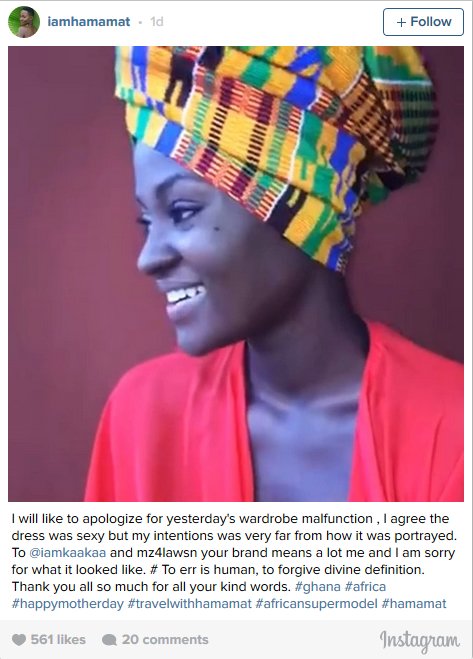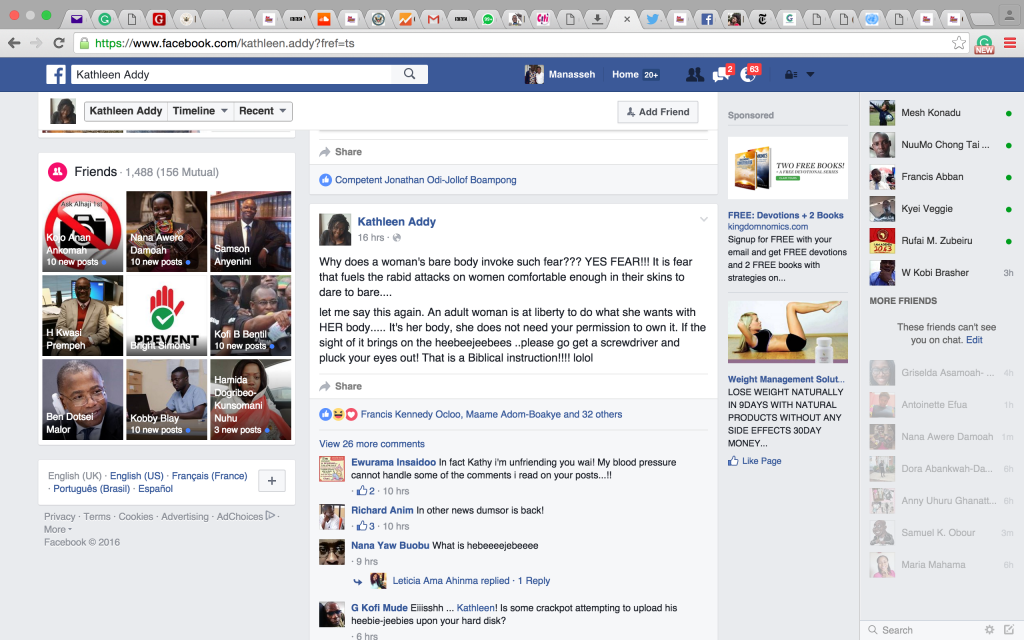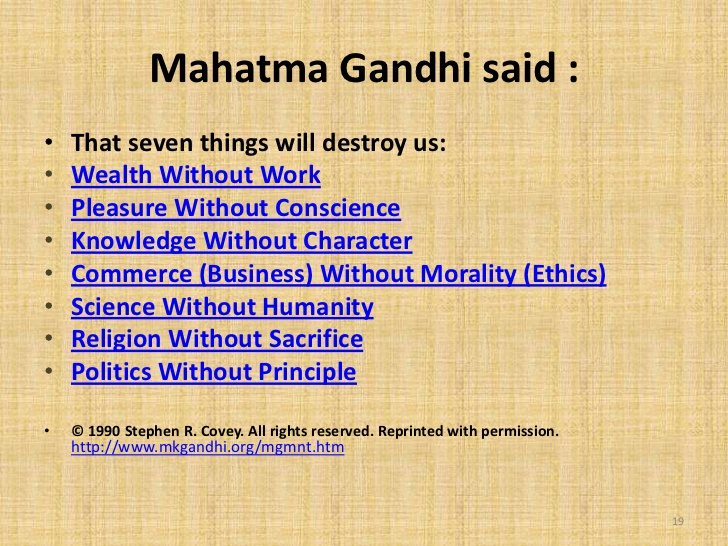Manasseh's Folder
MANASSEH’S FOLDER: A common sense response to Lydia Forson

Lydia Forson
Dear Lydia Forson,
I have read your letter. You had a point to make. And you made it clearly and forcefully. I do not agree with your point, but I learnt something from your piece.
This is despite the fact that you punctuated your message with insults and name-calling. In essence, you passed judgment. Ironically, you accused Hamamat’s critics of being judgmental. You described me as an attention seeker who is “constantly searching for anything to keep yourself relevant and you start to enjoy the applause, likes, comments etc you receive from strangers.” You described my followers as “hypocrites”.
You said I am “misogynistic and chauvinistic”. I have felt the need to reply you. But I will not call you names. I just want to explain my position to you. And those who think like you.
The story


For the sake of those who may not have followed the story, let me begin from the beginning. After the recent Vodafone Ghana Music Awards, two female celebrities caused social media to buzz because of what they wore to the event. They are actress Nadia Buari and former Miss Malaika winner, Hamamat Montia.
They wore dresses that revealed their breasts. Some people thought it was too indecent so they condemned them on social media. I did not pass a comment on either of them. Later, Hamamat apologised to her fans for the dress she wore and asked for forgiveness. I did not comment on her apology, the same way I did not comment on her dress code.
A day or two later, I read an article in which you, Lydia Forson, stated that Hamamat should not have apologised. This is how you started your article:
“I just read that Hamamat Montia former Miss Malaika winner who wore a daring dress to the VGMA’s showing her side boob, has apologized. Stupid stuff like this gets my blood boiling. Apologizing to who and for what?”

In that article, you descended heavily on those who criticised Hamamat’s dress code: “And half the nig**z complaining are probably jerking of (sic) over this picture and the women are probably angry they weren’t daring enough to pull it off.” Really?
You ended your article by advising Hamamat: “But my dear Hamamat next time stand by what you wore (cuz I know you were feeling yourself that night and were well aware of the side boob when you picked out the dress)… But NEVER apologize to people who don’t feed you like you’re some little girl with no brains.”
I totally disagreed with you, but I did not make any comment on your article. I thought you were entitled to your opinion. I had shared some of your previous write-ups with my readers. I agreed with you and commended you highly.
What made me comment on this issue was when Hamamat later granted an interview to Joy News, a week after the awards. In that interview, when she was asked about her take on nudity, the subject that brought her a lot of criticism, she said among other things that “if somebody is strong enough to show a part of them that has to be covered, for me that’s confidence and that should be seen as art.” I cringed with rage when I heard her.
I had earlier read somewhere that Moesha Boduong, the Ghanaian actress who is noted for dressing in a similar way, described her body as a work of art. Hamamat had earlier thanked you, Lydia Forson, for jumping to her defense when she was criticised. And I saw this comment as an inspiration she took from your article. I shared her video with the following post: “When you get wiser, you will look back and realise that the likes of Lydia Forson who encourage you to hold on to such lame-minded views really hurt you. Madness!”
I must admit that, on a sober reflection, I think I could have been less harsh in my criticism, which I am sincerely remorseful for. But I still stand by the import of my Facebook post. This is the message that led to your letter to me and I dare say your problem was not the harshness of my criticism. In your article, as in many of your writings, you sound harsher.

“I had earlier read somewhere that Moesha Boduong, the Ghanaian actress who is noted for dressing in a similar way, described her body as a work of art.”
Your accusations
Now to your accusations: You say I am an attention seeker. I have heard this many times, and I think you and the likes of Sam George who call me an attention seeker are partly right. The only thing you need to add to that description to be wholly accurate is the adjective “relevant”. I seek to be a relevant attention seeker. I am a journalist and writer. I must first get your attention before you can listen to me. This week, President Mahama addressed a section of Ghanaians in the United Kingdom and he talked about GYEEDA. Back home, two ministers of state met the Public Accounts Committee of Parliament and the main subject was GYEEDA. GYEEDA was a subject of my investigation in February 2013, but they are still talking about it. So it’s not entirely wrong to seek attention when it is relevant. There are many others who said worse things about Hamamat and your take, but you did not respond to them. Why? They may not be worthy of your attention. So call me a worthy and relevant attention seeker.
The accusation I cannot accept is when you described me as “chauvinistic and misogynistic.” I do not hate women. No, I don’t!
Do you remember how you and I came to be friends? It was exactly about this time last year when you wrote an article that was very critical of President Mahama at the peak of the power crisis. You and the likes of Yvonne Nelson, who spoke out, were subjects of attacks from people, who called you unprintable names. I was one of those who staunchly defended you and your comments, which in turn earned me a number of enemies.
When Archbishop Duncan Williams made comments to the effect that the achievements of a woman are nothing if she does not have a husband, you and I were on the same page. We wrote strongly about it. Years ago, when Maxwell Kofi Jumah accused Patricia Appiagyei of using sexual favours to snatch his political positions; I fought for Patricia Appiagyei even though I did not know her. These articles are online. And if you Google another of my articles, “Savannah View: The curse of being a female,” you will understand why I have made it a point to fight for women empowerment.
Last year when Lawyer Clara Beeri joined a panel on Newsfile to discuss the judicial corruption scandal, it was clear that she was the most brilliant among the panel that day. She tamed Lawyer John Ndebugre, who had started by bullying everyone on the panel. After Clara Beeri spoke and put Ndebugri in his proper place, he decided to patronise her looks instead of praising her brains: “I had heard about you but I didn’t know you were this beautiful,” he said. I took Lawyer Ndebugre on in my column that week. Clara was on the panel because of her brains, not beauty. The quality of women should not be reduced to looks, I argued.
And if you care to know, I met and fell in love with my girlfriend when she wrote a piece on feminism, urging women to stand for and pursue their dreams and not be subservient to the wishes of men.
I can go on and on, but what I want you to know is that I don’t hate women. I’m not misogynistic. Don’t be in a haste to judge and brand those who don’t agree with you on just one issue, when you don’t understand where they are coming from. I think we stand for the same cause – women empowerment. Our only point of departure, as far as I can recall, is the decency of women. My view on this is informed by this common sense scenario:
Mzbel is as talented as Okyeame Kwame, if not more talented than he. The two are musicians, but when you mention their names, they connote two different things. You know, don’t you? Why would Daddy Lumba dress very decently and sing while the female dancers appear half naked to shake their butts and boobs? At the recent VGMA, when Kofi Kinaata mounted the stage to perform, we admired him for his wisdom but the ladies who went with him on stage had to provocatively wriggle their waists. Is that all women have to offer? Women should be respected for their brains, talents and skills and not objectified as sex symbols. Hamamat should show her brains, not her boobs, if she wants attention or publicity.
When I was growing up, almost every Hollywood blockbuster I saw had a white man as the protagonist (blow man), accompanied by a strong black man who often acted stupid. He would do the donkeywork, get killed at a point and the white man would emerge a hero. It took me some time to realise that this was a deliberate way to define the place of the blacks. The objectification of women in movies, music videos and commercials as sex objects has a subtle way of undermining the fight for women empowerment. Feminists should not see any attempt to correct this anomaly as misogynist. How about the women who also condemn such shameful acts?
Interestingly, while you attack others and accuse them of being self-appointed moral crusaders, you show in your writings that you are a sort of standard for society. If you have done or got something wrong, then it’s no big deal. In the piece on Hamamat, you made reference to yourself when you talked about the photographer. When you talked about getting it wrong on the red carpet, you again used yourself as a standard of a sort:
“There’s nothing wrong with getting it wrong on the red carpet. Lord knows I’ve done it countless times, but it’s the red carpet not bloody heaven. And if you get it wrong you can either own your poor fashion sense or stand by what you wore. Because fashion, like all other things is relative.”

Lydia Forson is not alone in this school of thought. Kathleen Addy, a known female activist, thinks same
Ms. Lydia Forson, for your information, you are not the standard. If you get it wrong, it doesn’t mean it’s okay for everybody to get it wrong. And for your information, all other things are not relative. We have written and unwritten laws and moral codes that guide the conduct of human beings in every society. That’s what makes us different from animals.
Morality versus legality
Whoever thinks morality is not important in any intellectual discussion needs to think a little bit deeper and apply common sense to the concept of morality and legality.
I hold the view that morality is the foundation of laws. Morality is defined as “principles concerning the distinction between right and wrong or good and bad behaviour”. Any law that has been made in any society came from morality. The generality of people in that society must first distinguish between right and wrong or good and bad behaviour. In order to discourage wrong or bad behaviour, laws are made to punish those who breach the moral codes of those societies. Laws are made to cure mischief, to correct societal wrongs or to prevent them from happening.
Apart from laws and the constitution, we still have codes of conduct. These are moral codes. With time, some of them have been passed into law. Currently the Conduct of Public Officers Bill, 2013 is before the Parliament of Ghana. What started as a moral or ethical code is becoming an enforceable law. No society will survive when morality, decency and the values of that society are ignored.
I also hold the view that the main reason there is order and cohesion in society is not only because of the existence of laws. I don’t remember the last time you read the constitution or the criminal code before you acted in your daily life. If we all decide to break traffic laws, there will not be enough police officers to arrest us. We obey because we think it is right to do so. It’s a moral decision.
You asked in that article whether there is a law on dressing. There is no law on dressing, but common sense and human conscience tell us when or where to wear what. There is no law that prohibits Lydia Forson from sleeping with her best friend’s boyfriend. But I know you will not do that because you believe it to be wrong. That’s a purely moral decision. In my view, a human being who has no regard for morality (the principle of right or wrong) and the dictates of good conscience is not different from a wild beast.
And don’t attack people when they condemn an act they consider distasteful. If Hamamat had the right to wear what she liked, those who saw her in that dress also had the right to comment. Kwame Nkrumah once said that the “the most effective way to fight corruption is to build a strong public opinion against it.” Even where there are laws, public opinion plays an important role in holding people in check.
So who determines what is morally correct or incorrect? In other words, who is the standard for which we are to measure human behaviour? As Kofi Bentil of IMANI Ghana often says, the lowest denominator of society should not be our standard. Obviously, those who walk about practically naked are not the standard for women. Even the law does not expect lower standards. Oliver Wendell Holmes teaches us in his book, The Common Man that:
“…the law does not attempt to see men as God sees them, for more than one sees sufficient reason …If, for instance, a man is born hasty and awkward, is always having accidents and hurting himself or his neighbours, no doubt his accidental slips are no less troublesome to his neighbours than if they sprang from some guilty neglect.”

The law often refers to the “reasonable man” as the standard for measuring human behaviour. This is what A.P. Herbert in his book, The Uncommon Law, says of the reasonable man:
“Devoid, in short of any human weakness, with not a single saving vice, sans prejudice, procrastination, ill-nature, avarice, and absence of mind, as careful for his own safety as he is for that of others; this excellent but odious creature stands like a monument in our courts, vainly appealing to his fellow citizens to order their lives after his own example.”
From the above, the reasonable man is a perfect man. Nobody is perfect but the reasonable man does not lower the standards.
Lydia Forson, I am not a paragon of virtues. My standard may be too low for the society. But what I try to point out in my writings is what, I think, the reasonable man would point out, what we should aspire to be. The reasonable man does not think that it is okay for a mother of two, who is a role model to many young women, to appear in public advertising her boobs. The reasonable man does not believe that a grown up musician should show his penis in public because it is his body. The reasonable man would not say the function of the anus is for sex. The reasonable man does not think that everything is relative.
It is true that we have all sinned and fallen short of the glory of God. But that does not mean we should stop aspiring for heaven. Let’s look up to the reasonable man. And common sense.
The writer, Manasseh Azure Awuni, is a senior broadcast journalist at Joy 99.7FM. His email address is azureachebe2@yahoo.com

-

 Random Thoughts10 months ago
Random Thoughts10 months agoA Dutch Passport or a Ghanaian PhD?
-

 Foreign News10 years ago
Foreign News10 years agoEvery Animal Meat Is Not Beef! See All Their Names
-

 Manasseh's Folder12 months ago
Manasseh's Folder12 months agoManasseh’s Praise and Criticism of Akufo-Addo’s Action on the SML Scandal
-

 Guest Writers9 years ago
Guest Writers9 years agoProf. Kwaku Asare writes: Nana Akufo-Addo has no law degree but…
-

 Manasseh's Blog Posts9 months ago
Manasseh's Blog Posts9 months agoWho Started Free SHS?
-

 Manasseh's Folder9 months ago
Manasseh's Folder9 months agoIs Napo Arrogant? And Does It Matter?
-

 Anti-Corruption9 years ago
Anti-Corruption9 years agoMANASSEH’S FOLDER: Unmasking Afenyo Markins, NPP’s apostle of integrity
-

 Manasseh's Folder9 years ago
Manasseh's Folder9 years agoEXCLUSIVE PHOTOS: Manasseh Azure Awuni marries “Serwaa”